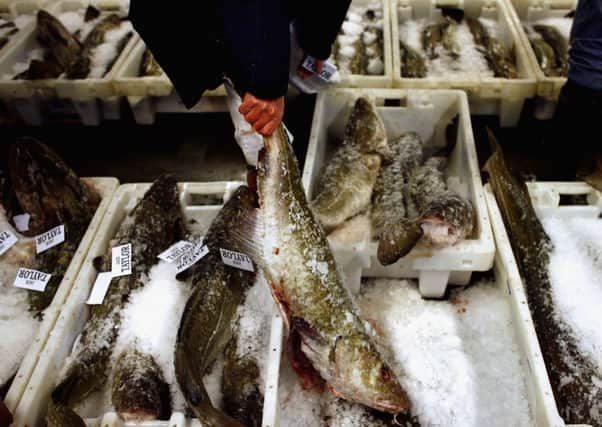Scottish fisherman hail '˜positive outcome' from EU talks


The Scottish Government said the fishing industry will benefit from deals set to deliver additional fishing opportunities worth around £45 million.
The overall package includes increased fish quotas for 16 out of 23 key Scottish stocks, such as cod, saithe and mackerel.
Advertisement
Hide AdAdvertisement
Hide AdDeals negotiated in Brussels over the past two days included increases of £12 million for Norway lobster and £5 million for monkfish, the Scottish Government said.
Bertie Armstrong, chief executive of the Scottish Fishermen’s Federation, said: “Overall, this is a positive outcome for Scotland which underlines the sustainable fishing practices adopted by our fleet. The agreement will bring welcome economic stability to Scottish fishing communities over the coming year.”
However there is concern in the industry about the practicalities of the discard ban.
Mr Armstrong said: “Although the outcome of the talks is good for the fishing fleet, we are concerned about the potential difficulties caused by more species coming into the discard ban regime.
“Fishermen hate discarding, but there is the worrying potential of mixed species fisheries closing down early because the catch allocation of one type of fish has been fully utilised. This is something that will have to be monitored very closely over the coming months.
The Scottish Government said significant wins from this year’s talks also included an extra 1,500 tonnes of Arctic cod quota coming to the UK following an increase at the EU/Norway talks.
This will be available for swaps with other countries to bring in additional quota of stocks that may be running short in the North Sea, such as cod, haddock, whiting and saithe which is particularly important with more stocks coming under the discard ban in 2017.
The talks also secured extra flexibility around where vessels are able to fish. This will remove current constraints around fishing for northern shelf haddock, and provide more choice over fishing grounds, resulting in reduced costs for vessels.
Advertisement
Hide AdAdvertisement
Hide AdMr Ewing said: “The fishing industry is a vital part of our rural economy which is why it’s good news that we’ve secured crucial increases for the majority of our key species. These deals are worth around £45 million to the industry.
“To achieve improved deals for 16 out of 23 of our key stocks is a very satisfactory outcome for the Scottish fleet and one that’s been strongly welcomed by the senior industry representatives in Brussels.
“I’m delighted that our long-standing calls to give vessels greater flexibility around where they can fish, have been answered, and from 2017 our fleet will be able to make use of this new provision.
“In these uncertain times I’m pleased that issues around Brexit did not compromise our negotiating position. We worked constructively to put people’s livelihoods first, and, founding on the scientific advice, helped secure a good deal that can be well received by Scots fishermen.”
Mike Park, chief executive of the Scottish White Fish Producers’ Association (SWFPA), said the annual December Fisheries Council had produced a “mixed but positive bag” for Scottish fishermen.
“Given that the discard ban or landings obligation will apply to cod in 2017, it was hugely important that cod quotas were increased to more closely represent the numbers on the ground, so that is very welcome.
“Through the commitment of Scottish fishermen to sustainability, North Sea cod stocks have recovered markedly in the past while, which is why we have entered cod into the Marine Stewardship Council process for accreditation.
“But less welcome is the reduction in haddock quotas to redress a previous ‘error’ by the scientists.”